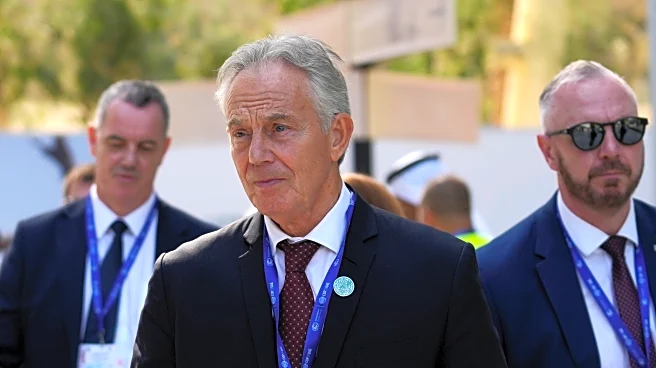LIVERPOOL, England (AP) — Former British Prime Minister Tony Blair has returned to the forefront of Middle East peace efforts after a U.S. peace plan on ending the Israel-Hamas war cast him in a leading role in overseeing the post-war administration and reconstruction of the Gaza Strip.
It’s familiar territory for Blair, who spent eight years working to promote peace between Israel and the Palestinians as the international community’s envoy to the Middle
East.
His decision to step down in 2015 was seen as a reflection of the dire state of Mideast peace efforts that devolved further under the government of Israeli Prime Minister Benjamin Netanyahu.
The U.S. proposal — which President Donald Trump and Netanyahu said they agreed on after talks at the White House on Monday — would put Gaza’s territory and its more than 2 million people effectively under international control, deploying an international security force and installing a “Board of Peace” headed by Trump and Blair to oversee the administration and reconstruction.
Hamas said Tuesday it would study the plan, both within the group and with other Palestinian factions before responding.
Blair has decades of experience in the Middle East. For some that’s his great strength — and for others his huge weakness.
As prime minister between 1997 and 2007, he took the United Kingdom into the U.S.-led invasion of Iraq in 2003 despite strong public opposition. The subsequent conflict killed 179 British troops, some 4,500 American personnel and hundreds of thousands of Iraqis.
A public inquiry concluded in 2016 that Blair took the country to war based on flawed intelligence and “before the peaceful options for disarmament had been exhausted.” But it did not say that the war was illegal, which could have opened the way for Blair to be prosecuted for war crimes.
Blair has defended his decision to go to war, saying he did it in good faith, believing that Saddam Hussein possessed weapons of mass destruction.
After leaving office in 2007, Blair was appointed Middle East envoy by the “Quartet” of the United States, the European Union, Russia and the United Nations — a post that began with great promise but which struggled to deliver dramatic changes in its quest to promote peace between Israel and the Palestinians.
Blair’s experience in British politics and name recognition offered hope that he had the charisma and connections that might bring progress.
But his work became mired in skirmishes over issues such as the movement of Palestinian goods and people in the West Bank, and dealing with the difficulties of a Gaza Strip ruled by the militant Hamas group and blockaded by Israel and Egypt.
He quit in 2015 with little to show in the way of progress toward a Palestinian state. That was long before the Hamas-led Oct. 7, 2023 attack on Israel ignited the latest war and further poisoned hopes for peace and stability.
Recently Blair has been part of high-level planning talks with the U.S. and others about the future of Gaza.
In a statement, Blair said Trump’s “bold and intelligent” plan offers “the best chance” of ending the Gaza war. He did not mention his own potential role.
U.K. Prime Minister Keir Starmer said Trump’s announcement of a peace plan was “profoundly welcome” and called “on all sides to come together and to work with the U.S. administration to finalize this agreement and bring it into reality.” He didn’t mention Blair’s potential involvement.
Blair remains a divisive figure in the Labour Party, praised by some for winning three consecutive elections but forever tarnished in the eyes of others because of the war.
Health Secretary Wes Streeting acknowledged that “there’ll be some people who look at Tony Blair and his legacy in Iraq and will raise eyebrows to say the least about whether he’s the right man to be involved in this.”
But he noted that Blair played a key role in ending decades of violence in Northern Ireland with the 1998 Good Friday peace agreement, experience that could prove essential in the Middle East.
Michael Stephens, an international security expert at the Royal United Services Institute think tank, said that Blair being given a role in a transitional Gaza authority “has rings of 2003 about it, so it feels uncomfortable.
“But if it brings ceasefire it may not be the worst option,” he said.
War-weary Palestinians from Gaza expressed little enthusiasm for Blair.
“Blair is rejected by the people,” said Hussein Dhaher, a displaced man from Gaza’s northern town of Beit Hanoun. “This man has the blood of Iraqis on his hands. He only brings ruin and destruction.”
Umm Mohammed, a history teacher who shelters with her family in Gaza City, wondered why a Palestinian leader could not have been found instead of Blair.
“This man is hated in the region because of his role in destroying Iraq, and he won’t bring anything good to us Palestinians,” she said.
___
Kirka reported from London. Associated Press writer Samy Magdy in Cairo contributed to this report.
















